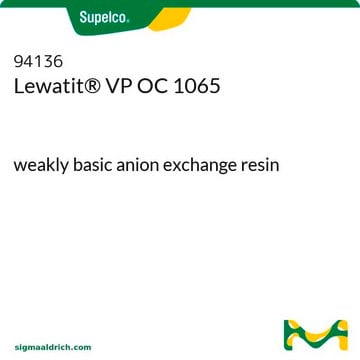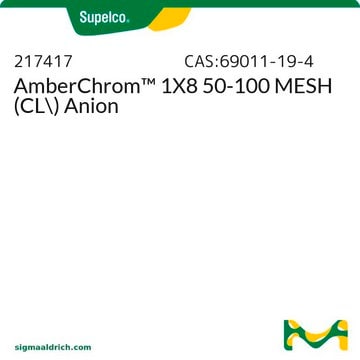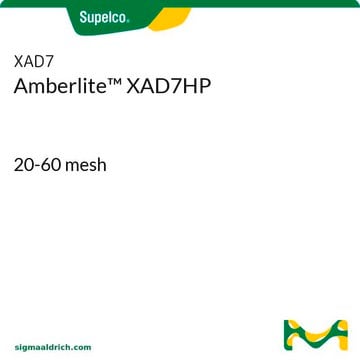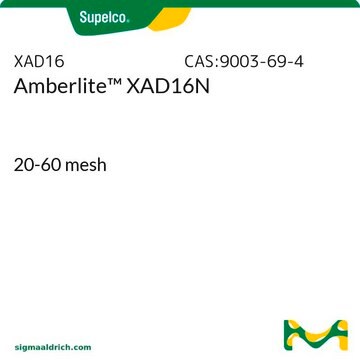62107
Lewatit® MonoPlus TP 214 Ion Exchange Resin
macroporous, 30-35 mesh
Faça loginpara ver os preços organizacionais e de contrato
About This Item
Produtos recomendados
product name
Lewatit® MonoPlus TP 214, ion exchange resin, macroporous
Nível de qualidade
forma
macroporous
umidade
43-48%
técnica(s)
LPLC: suitable
perda
40-60% loss on drying, 110 °C
matriz
styrene-divinylbenzene (macroporous)
Grupo ativo da matriz
thiourea functional group
tamanho de partícula
400-1250 μm
capacidade
1.0 meq/mL by wetted bed volume
técnica de separação
affinity
Categorias relacionadas
Descrição geral
Lewatit MonoPlus TP 214 is a type of chelating ion-exchange resin.
Aplicação
Lewatit MonoPlus TP 214 may be used as a mercury-specific adsorber resin for the removal of mercury from contaminated groundwater samples prior to its determination by cold vapor atomic absorption spectrometry (CV-AAS). It may also be used as an ion-exchange resin for the determination of platinum and palladium in particles emitted from automobile exhaust catalysts prior to their analysis using cathodic adsorptive stripping voltammetry (CASV).
Chelating resin especially suited for the removal of metals in hydrometallurgical processes and for the extraction/recycling of mercury and silver.
Informações legais
Lewatit is a registered trademark of Lanxess Deutschland GmbH
Código de classe de armazenamento
11 - Combustible Solids
Classe de risco de água (WGK)
WGK 3
Ponto de fulgor (°F)
Not applicable
Ponto de fulgor (°C)
Not applicable
Equipamento de proteção individual
Eyeshields, Gloves, type N95 (US)
Choose from one of the most recent versions:
Já possui este produto?
Encontre a documentação dos produtos que você adquiriu recentemente na biblioteca de documentos.
Kimberly C Martin et al.
Journal of anatomy, 230(6), 766-774 (2017-04-04)
Branching morphogenesis of epithelia involves division of cells into leader (tip) and follower (stalk) cells. Published work on cell lines in culture has suggested that symmetry-breaking takes place via a secreted autocrine inhibitor of motility, the inhibitor accumulating more in
Determination of Pt and Pd in particles emitted from automobile exhaust catalysts using ion-exchange matrix separation and voltammetric detection.
Paraskevas M, et al.
Microchimica Acta, 176(1-2), 235-242 (2012)
Birga Soetje et al.
Frontiers in genetics, 11, 248-248 (2020-04-16)
Three-dimensional culture systems that allow generation of monolayered epithelial cell spheroids are widely used to study epithelial function in vitro. Epithelial spheroid formation is applied to address cellular consequences of (mono)-genetic disorders, that is, ciliopathies, in toxicity testing, or to
Tim N Koepp et al.
International journal of molecular sciences, 22(17) (2021-09-11)
The renal secretory clearance for organic cations (neurotransmitters, metabolism products and drugs) is mediated by transporters specifically expressed in the basolateral and apical plasma membrane domains of proximal tubule cells. Here, human organic cation transporter 2 (hOCT2) is the main
Wenlong Li et al.
Pharmaceutics, 13(11) (2021-11-28)
Repotrectinib shows high activity against ROS1/TRK/ALK fusion-positive cancers in preclinical studies. We explored the roles of multidrug efflux transporters ABCB1 and ABCG2, the OATP1A/1B uptake transporter(s), and the CYP3A complex in pharmacokinetics and tissue distribution of repotrectinib in genetically modified
Nossa equipe de cientistas tem experiência em todas as áreas de pesquisa, incluindo Life Sciences, ciência de materiais, síntese química, cromatografia, química analítica e muitas outras.
Entre em contato com a assistência técnica








